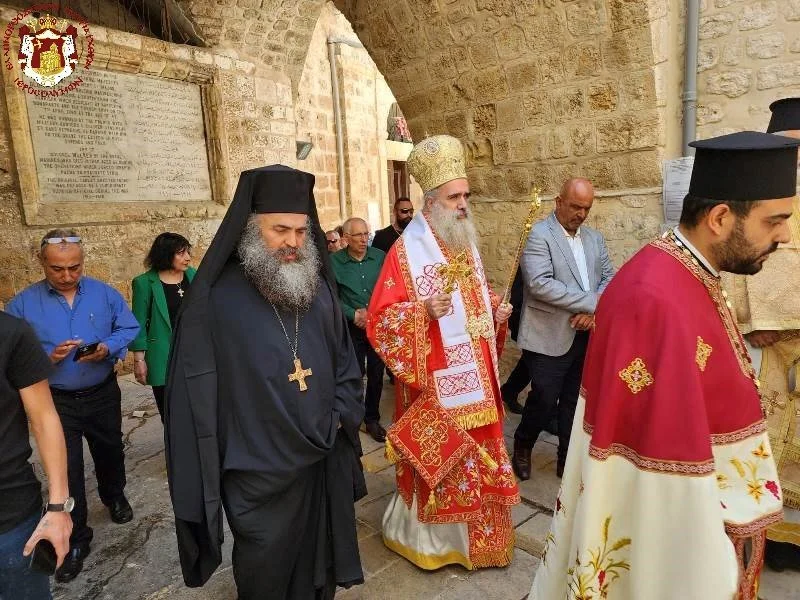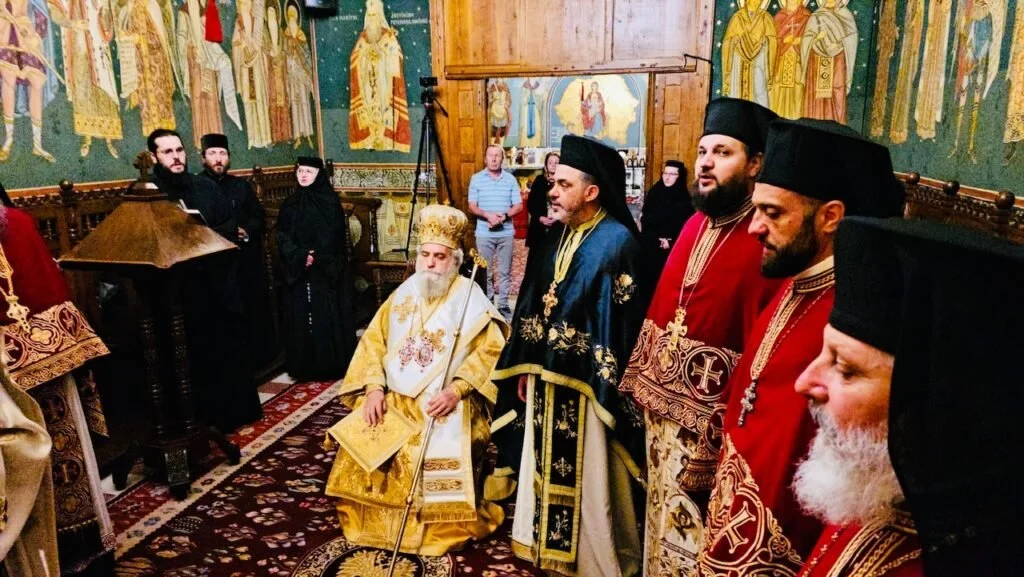The Feast of the Holy Great Martyr Georges the Trophy Bearer at the Greek Orthodox Patriarchate of Jerusalem
On Saturday, April 23/May 6, 2023, the memory of the Holy Great Martyr George the Trophy Bearer was celebrated by the Greek Orthodox Patriarchate of Jerusalem.
On this feast, the Church recalls in its memory that Saint George was by origin Cappadocian by father and Palestinian by mother. He served as a tribune, i.e. a centurion, in the Roman army, hiding his Christian identity at first, revealing it later, confessing Christ, being tortured and testifying for Him in AD 303 during the reign of Diocletian.
His holy relics were taken by his servant to Lydda, his mother’s homeland, and were then kept in the Holy Church erected in his name by Saint Helen.
His commemoration was celebrated:
In the Old City at the Monastery dedicated to him which is also called ‘the hospital’, with Vespers on Friday afternoon and the Divine Liturgy on Saturday morning, which were officiated by His Eminence Archbishop Aristarchos of Constantina, with the co-celebration of Hieromonk Sila, Priest Athanasios and Hierodacon Simeon. The chanting was delivered by Mr Demetrios Manousis with the help of the Patriarchal School of Zion students, as the services were attended by a large congregation of monks, nuns, pilgrims and the representatives of the Greek Consulate in Jerusalem, Mrs Christina Zacharioudaki and Mrs Constantina Gyftou.
His Eminence Archbishop Aristarchos of Constantina delivered the following sermon to this congregation:
“Reverend Abbess, nun Pansemni,
Your Excellency, Mrs Christina Zacharioudaki,
Dear priests,
My beloved brothers in Christ,
Living in the middle of the season of spring we enjoy the joy of the beauty of blooming nature. This is God’s gift to us humans, just like the rain of the last days, a sign of His love for us. Living in the midst of the Easter season, we share in the spiritual joy and rejoicing of Christ’s Resurrection. We are touched and excited by the joyous, paschal hymns of the Church. Despite this, the Church gives us today one more source of joy and happiness. It provides us with the memory of one of its great martyrs, Saint George the Trophy Bearer. the memory of Saint George becomes the reason for our assembly today, for the celebration of the divine liturgy, for sharing in the holy eucharist and for our sanctification and salvation. Within this rich spiritual liturgical bank, the narrative of the martyr’s life has its place for the additional nourishment and strengthening of our souls.
The memory of the Church, which is the synaxarion, maintains that Saint George lived during the time of the Roman emperor Diocletian. On his father’s side, he was from Asia Minor, Cappadocia. On his mother’s side, he was Palestinian. He served in the Roman army. When persecution was unleashed against the Christians, he did not accept to receive rewards, positions and offices, in order to deny Christ. Instead, he confessed and proclaimed his faith in Christ. He remained relentless in promises, undaunted in threats and rigid and inflexible in torture. His strong faith in Christ overcame sickness and the pains of nature. With the grace of Christ, he remained unharmed from all the tortures, with the result that many people saw and believed in Christ, including Diocletian’s wife Queen Alexandra. More still believed, when the Saint entered a temple of idols and with his prayer, he overthrew the statues of false gods. Then his executioners and the demon worshipers could not stand it and brought him to the emperor Diocletian and demanded his condemnation. The emperor ordered his beheading by a sword, as well as that of Queen Alexandra, who in the meantime surrendered her soul to God in prison.
Today, the Church presents Saint George to us as an example of strong faith in Christ, an example of patience and determination, an example of charity to the poor, because he distributed his property to them according to a covenant, which he gave to his servant, before his martyrdom. He entrusted him with the transfer of his relics to his mother’s hometown, Lydda. At the place of his burial, a magnificent church was later built by Saint Helen, the inauguration of which is celebrated on the other feast of the Saint on November 3.
The grace of the Holy Spirit, which raised up Saint George and all the martyrs, remains active in the Church throughout the centuries. It is this grace that also highlighted the new martyr George, Cypriot by origin, who was working in Acre and did not accept to change his faith when this was proposed to him by the Turkish pasha in 1752. His tomb at the door of the monastery and his relic, which is offered today for worship, are a blessing for the Orthodox community and for the whole city of Acre.”
The Episcopal Entourage and the congregation were offered a reception by the Abbess, nun Pansemni, who has restored the holy icons of the Church.
At the holy monastery dedicated to him in the Jewish Quarter of the Old City, the Divine Liturgy on Saturday morning, was led by Archimandrite Amphilochios, with the attendance of faithful Christians who honoured the Saint. The full congregation was offered a reception by the renovator of the Church, reverend Abbess, nun Marianna.
At the Holy Church dedicated to the Saint in Arcre-Ptolemais, with a Divine Liturgy that was officiated by His Eminence Archbishop Theodosios of Sebasteia, with the co-celebration of the Patriarchal representative Archimandrite Philotheos, at the attendance of a large congregation of the Orthodox faithful of this city.
At the Holy Monastery of Saint George Al Khader of the Bethlehem area, led by the Patriarchal Representative in Bethlehem, His Eminence Metropolitan Benediktos of Diocesarea, with the co-celebration of Archimandrite Ignatios and local Priests, at the presence of the Consul General of Greece in Jerusalem Mr Evangelos Vlioras.
At the Holy Monastery of Saint George in Lydda, where the Divine Liturgy was presided over by Archimandrite Marcellus.
On Sunday, April 24th / May 7th, 2023 in the Holy Church of the Delegation of the Patriarchate of Romania in the Jewish quarter of the religious Jews of the New City of Jerusalem, presided over by His Eminence, Metropolitan Isychios of Kapitolias, with concelebrants, the Head of the Delegation Archimandrite Theophilos and his assistant Archimandrite Ioannis, who at noon hosted a meal in honour of the Episcopal Entourage. His Eminence delivered the solemn sermon to the congregation, speaking through the following address as follows:
“Reverend Archimandrite Theophilos, Representative of His Beatitude Patriarch Daniel in the Holy City of Jerusalem,
Beloved brothers and sisters in Christ,
Reverend Christians
We are gathered today to celebrate in a Paschal and Eucharistic manner the great mystery of philanthropy our Risen God and Saviour Jesus Christ and the commemoration of the Holy Great Martyr George the Trophy Bearer.
The memory of the Saints of the Church, especially of its Great Martyrs constitutes the irrefutable testimony of Christ’s resurrection and our hope in Christ, as Saint Paul also proclaims: “But now is Christ risen from the dead, and become the firstfruits of them that slept. For since by man came death, by man came also the resurrection of the dead. For as in Adam all die, even so in Christ shall all be made alive” (1 Cor. 15, 20-22). “Behold, the spring of grace has risen, the Resurrection of Christ has shone all over; and with this now, the feast day of George the Martyr and the light-bearing day; let us all celebrate in joy, shining in a godly manner,” the hymnographer says.
The martyrdom of the blood of Christ’s friends, and that of the great martyr George the Trophy-bearer, constitutes a strong and irrefutable eternal testimony in the historical course of the human race, that the death of Christ, and consequently His Resurrection, corresponds to the existential death of man, on the other hand, it determines the fullness of the man living in Christ under the view of his being made in the image and likeness of God. (Gen. 1,26). This is what the renowned Father of the Church, Gregory the Theologian, says in this regard: “He impoverishes my flesh, so that I may be enriched by his Divinity. And the full is being emptied. He is emptied from His own glory on a small scale, so that I may partake of His fullness. What is the wealth of goodness? What is this mystery about me? I partook of the image and I didn’t save it. He partakes of my flesh, so that he may save the image and immortalize the flesh”.
This news was originally published on the website of the Greek Orthodox Patriarchate of Jerusalem. Please click here to read the full text.















